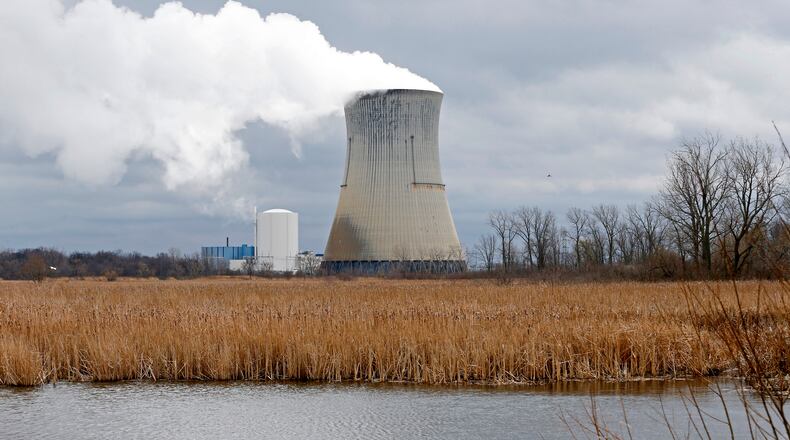During a mid-January interview with the Dayton Daily News, Ohio Gov. Mike DeWine, a Republican, said he would be open to further changes in HB 6 so long as Ohio’s nuclear power plants are protected. It’s “not a concern for me” for the bill’s other provisions to be kept, he said.
House Bill 6, pushed by electric company FirstEnergy, increased electric rates and provided huge subsidies for nuclear and coal-fired power plants while cutting subsidies for energy efficiency and renewable sources.
Prosecutors allege FirstEnergy paid nearly $61 million in bribes to then-House Speaker Larry Householder to get HB 6 passed. Householder was expelled from the General Assembly last June and faces a federal corruption trial.
A federal criminal investigation is ongoing. Lawmakers repealed the bill’s nuclear-plant bailout, but the bill’s subsidies for coal plants and other projects remain.
“There’s still a lot of questions about who knew what and when, about this nuclear bribery scandal,” Crossman said.
He is running unopposed in the spring partisan primary. Incumbent Attorney General Dave Yost is also unopposed in the Republican primary. Crossman said he is running for attorney general to counter the “culture of corruption” that led to HB 6.
Public-records requests to Gov. Mike DeWine’s and Yost’s offices have not been fully answered, but what has been released shows the scandal is “bigger and broader” than previously known, he said.
“Larry Householder didn’t work alone,” he said.
Crossman alleged DeWine’s office worked with Sam Randazzo, then chair of the Ohio Public Utilities Commission, to pass HB 6.
“We know that the governor’s office was involved,” Crossman said.
Tierney said the governor’s office had no part in the bribery scandal and that the records Crossman cites don’t support his claims.
“We have provided Rep. Crossman, in response to his record requests, more than 800 pages of documents,” DeWine’s Press Secretary Dan Tierney said Thursday.
The governor’s office is still working to fulfill some document requests, Tierney said, but he characterized those requests as a political fishing expedition.
In response to Crossman’s call for state criminal investigations and for Yost to provide more public information, Yost’s campaign manager Amy Natoce referred to a February 2021 news release from the attorney general’s office that said court action to block the nuclear bailout and a settlement to end a guaranteed profit rider would save nearly $2 billion over the bill’s decade-long duration.
“Attorney General Yost went to court and stopped $2 billion from being plucked out of Ohioans’ pockets into FirstEnergy’s corrupt coffers,” Natoce said via email. “The lawsuit is mightier than the Zoom press conference — and far more effective.”
A Democratic Party news release says the records requests seek any communications between the governor’s office, people implicated in the scandal, and related issues including the appointment of Randazzo. But those requests have been “stonewalled at every turn by the DeWine administration,” the news release says.
DeWine appointed Randazzo to the PUCO board in early 2019, but he resigned when the bribery scandal broke. Randazzo has not been criminally charged, but was named in Yost’s civil lawsuit and $8 million of his assets have been frozen.
The Federal Energy Regulatory Commission told FirstEnergy on Feb. 4 to come up with a plan to refund millions used to lobby for HB 6. A federal audit of the utility, covering 2015 to 2021, found the company spent up to $70.9 million on lobbying and related expenses in that time.
In November, FirstEnergy agreed to return $306 million in excessive profits to Ohio ratepayers, a combination of refunds and bill credits averaging $85 per residential customer. Months earlier, the company agreed to pay $230 million in penalties to avoid federal prosecution in the $60 million bribery scandal.
The Ohio Consumers’ Counsel and Ohio Poverty Law Center sent a letter to DeWine on Feb. 9, asking him to reject all four nominees to the PUCO board as too closely tied to the utility industry, and seek new candidates. The groups also ask to change the process of choosing PUCO board members to direct public election instead of gubernatorial appointment, with bans on utilities contributing or campaigning.
On Thursday afternoon DeWine’s office issued a statement that he had reappointed one of those nominees, Daniel Conway, to another five-year term.
About the Author

